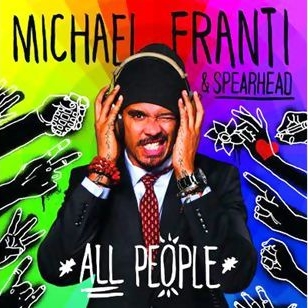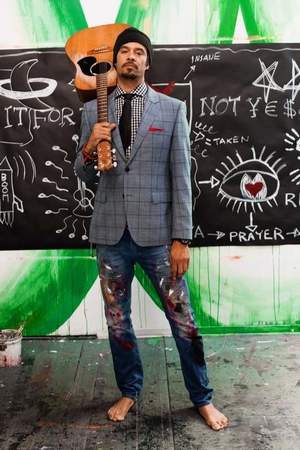|
Taken from phillyBurbs (September 20, 2013)
Franti changing the world a musical moment at a time
by NAILA FRANCIS


Photo courtesy of Lauren Dukoff
"We want people to walk out of there with their shoulders
a little taller, standing a little higher and smiling,"
says Michael Franti of his concerts. |
When Michael Franti traveled to Iraq in 2004, the trip was part of a self-funded journey that also took the musician and activist to Israel and Palestine to learn about the everyday lives of people living through war and occupation.
Traveling with a small camera crew, Franti documented what he discovered in his 2005 film, “I Know I’m Not Alone,” in which he talked to dozens of civilians, as well as American troops stationed in Iraq, about the impact of war. The singer-songwriter and poet also performed his music, on his own and with local artists.
“I’d be playing music on the street for civilians. They’d say to me, ‘We don’t want to hear songs about war, we want to hear songs that make us laugh and make us dance and make us clap and sing and sometimes make us cry.’ Music is best when it’s that,” says Franti, who released a new album, “All People,” with longtime backing band Spearhead, in July.
That ethos informs the San Francisco musician’s latest outing, which delivers expected sociopolitical themes with an even greater pop buoyancy than 2010’s “The Sound of Sunshine” and its predecessor “All Rebel Rockers,” which launched Franti and Spearhead to mainstream success on the strength of irrepressible single “Say Hey (I Love You).”
Here, his loose template of reggae, hip-hop, rock and funk takes on an electro-pop sheen. The shift comes courtesy of Franti’s decision, after collaborating with the guys in his band and a select few artists over the years — most notably Jamaican production team Sly & Robbie — to work with a different crop of writers and producers.
Sam Hollander, whose hit-making roster includes acts like One Direction and Katy Perry, Grammy-winning pop powerhouse The Matrix and Australian songwriter-producer Adrian Newman all helped Franti embody that spirit of escapist fun those civilians embraced.
“I just really wanted to try a new approach to songwriting,” says Franti, who brings his “All People Tour” to the Electric Factory in Philadelphia on Saturday. “I thought at first collaborating with other people would make the songs less personal but, actually, the opposite happened. Every time I got stuck for a phrase, or stuck for a certain chord change or something, I had this other person who could say, ‘Well, what if we did this?’ It made me approach songwriting in a different way because every single person I worked with had a completely different writing style.”
Beneath the epic dance beats, Franti still looks to inspire the kind of soul-searching and action that would sustain a more peaceful and unified planet. Infectious lead single “I’m Alive (Life Sounds Like)” is a call for living with greater acceptance and authenticity, while tracks like “Show Me a Sign” and “Earth from Outer Space” champion love as a balm for the world’s horrors and heartaches. Slower-tempo numbers like “11:59” and “Say Goodbye” speak to his frustration with current events. Both were inspired by the shooting of Trayvon Martin, the latter a lament for anyone who’s ever lost a loved one to war or other acts of violence.
“This whole record is sort of asking the classic existential questions: I have x amount of days on this planet, and who do I want to spend them with? What do I want to do? What’s the mark I want to leave behind? Many of the songs are love songs about my partner and my family and my kids. Other songs are what I believe about the world,” he says. “The title of the record is ‘All People’ and it’s really a statement of the beauty of the diversity that we see in our country and on our planet and the fact that I believe that every life — no matter if it’s black, white, rich, poor, gay, straight — every life matters.”
Such openness has its roots in Franti’s own upbringing. The Oakland native was born to an Irish-German-French mother and an African-American and Seminole Indian father and was adopted as a baby by a Finnish-American couple. They raised him along with their three biological children and an adopted African-American son. Franti’s mom, a public school teacher, instilled in her children many of the values and beliefs that have fueled his philanthropy and creativity.
“My mother was insisting that all five of us kids, even though we were all different in our personalities, that we all be treated the same,” he says. “She was a very tough lady, but she insisted we treat everyone we met with respect and the way we want to be treated.”
While Franti has taken that message to a global platform, speaking out against the degradation of humanity and the environment wherever and whenever he can, this year he launched a more-personal campaign directly related to music. The Do It For The Love Foundation, which he founded with his partner, Sara Agah, in August, will connect people with severe disabilities and life-threatening illnesses with the concert experience of their dreams.
Franti and Agah were inspired to launch the organization after being contacted by Hope Dezember, the wife of Steve Dezember, a fan in the advanced stages of Lou Gehrig’s disease who wanted to meet Franti at what would likely be his last concert. The musician invited the couple onstage during a festival performance in Florida in April. There, an almost completely paralyzed Steve whispered to Hope he wanted to dance.
“With all of her strength, she lifted him up out of his wheelchair and they danced with their arms around each other in front of 15,000 people at this festival and everyone cheered,” recalls Franti. “She told me that was a really life-changing moment for them. In their honor, I started (the foundation).”
For all his revolutionary beginnings with groups The Beatnigs and Disposable Heroes of Hiphoprisy, where he railed, often abrasively, against injustice, it is moments like these that have affirmed for him the true power of music.
“Music doesn’t change the world overnight, but music helps us get through a difficult night,” says Franti. “It’s the accumulation of all those moments that changes people’s lives — and that changes the world.”
|